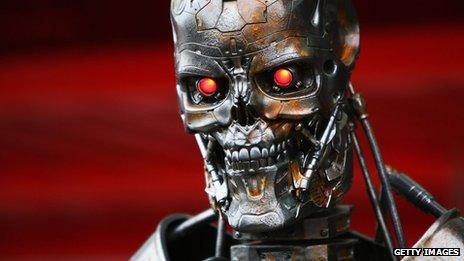Risk of robot uprising wiping out human race to be studied
- Published
- comments

In The Terminator, the machines start to turn on the humans
Cambridge researchers are to assess whether technology could end up destroying human civilisation.
The Centre for the Study of Existential Risk, external (CSER) will study dangers posed by biotechnology, artificial life, nanotechnology and climate change.
The scientists said that to dismiss concerns of a potential robot uprising would be "dangerous".
Fears that machines may take over have been central to the plot of some of the most popular science fiction films.
Perhaps most famous is Skynet, a rogue computer system depicted in the Terminator films.
Skynet gained self-awareness and fought back after first being developed by the US military.
'Reasonable prediction'
But despite being the subject of far-fetched fantasy, researchers said the concept of machines outsmarting us demanded mature attention.
"The seriousness of these risks is difficult to assess, but that in itself seems a cause for concern, given how much is at stake," the researchers wrote on a website set up for the centre, external.
The CSER project has been co-founded by Cambridge philosophy professor Huw Price, cosmology and astrophysics professor Martin Rees and Skype co-founder Jaan Tallinn.
"It seems a reasonable prediction that some time in this or the next century intelligence will escape from the constraints of biology," Prof Price told the AFP news agency.
"What we're trying to do is to push it forward in the respectable scientific community."
He added that as robots and computers become smarter than humans, we could find ourselves at the mercy of "machines that are not malicious, but machines whose interests don't include us".
Survival of the human race permitting, the centre will launch next year.
- Published16 March 2012
- Published8 March 2012